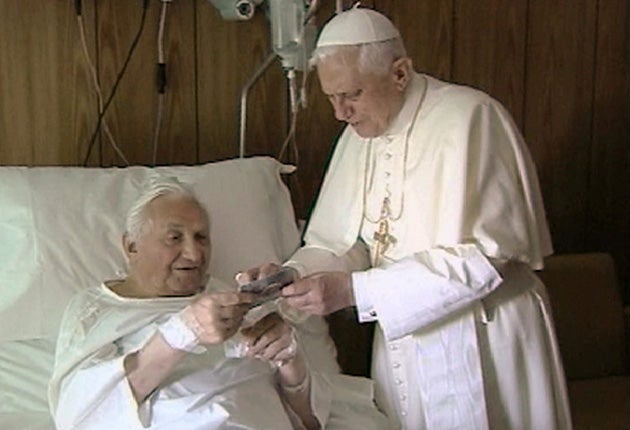I slapped pupils, admits Pope's brother

Your support helps us to tell the story
From reproductive rights to climate change to Big Tech, The Independent is on the ground when the story is developing. Whether it's investigating the financials of Elon Musk's pro-Trump PAC or producing our latest documentary, 'The A Word', which shines a light on the American women fighting for reproductive rights, we know how important it is to parse out the facts from the messaging.
At such a critical moment in US history, we need reporters on the ground. Your donation allows us to keep sending journalists to speak to both sides of the story.
The Independent is trusted by Americans across the entire political spectrum. And unlike many other quality news outlets, we choose not to lock Americans out of our reporting and analysis with paywalls. We believe quality journalism should be available to everyone, paid for by those who can afford it.
Your support makes all the difference.The Pope’s older brother has admitted to slapping pupils in the face while he was leader of a renowned choir in Germany which is currently at the centre of a new rash of child abuse allegations rocking the Catholic Church.
Georg Ratzinger, who led the Regensburger Domspatzen choir for thirty years until his retirement in 1994, confessed to occasionally hitting his pupils but added that he now regretted using corporal punishment.
In an interview with the Bavarian daily newspaper Passauer Neue Presse, the Pope’s older brother admitted: "At the start, I also slapped people in the face but I always had a bad conscience."
The stark admission will pile pressure on the Catholic Church in Germany to declare exactly how much it knew about abuse that was being perpetrated by its clergy and whether anything was done to protect children in its care.
Previous investigations into child abuse in the United States and Ireland have shown how the church authorities often avoided clamping down on abusive clergy, choosing instead to simply move them into new parishes where the abuse continued.
Both Germany and Holland have been rocked in recent weeks by a whole new series of abuse allegations most of which stem back to the 1960s and earlier.
The Regensburger Domspatzen (which translates as the Regensburger Sparrows) is just one of a number of prestigious Catholic organisations that have been linked to clerical abuse – a national scandal that first emerged last month with an historical investigation in Jesuit schools.
In the Bavarian Regensburg diocese three Catholic schools have been implicated. The diocese has already admitted that one priest abused two boys sexually in 1958 and was sentenced to two years in jail. Another clergyman served 11 months in jail in 1971 for abuse. Other former pupils have said they suffered sexual abuse and excessive beatings and humiliation in the early 1960s by unnamed teachers.
In the interview published today, Georg Ratzinger, who led the sparrows from 1964 to 1994, appeared to signal that knew physical punishments were meted out to his pupils but he had been unaware of how brutal the beatings often were.
"Pupils told me on concert trips about what went on,” he said. “But it didn't dawn on me from their stories that I should do something. I was not aware of the extent of these brutal methods.”
He added: “If I had known about the excess of force he was using, I would have said something ... I ask the victims for forgiveness."
The 86-year-old said he had no indication that pupils were being sexually abused and added that staff had never talked about it. Although an admission from the Pope’s brother that he hit pupils may shock many today, at the time such beatings were perfectly legal in Germany which only banned corporal punishment in 1980.
But the allegations emanating out of Regensburg are awkward for the Vatican because the Pope and his brother spent so much of their careers there. Survivor groups have now called on the pontiff to talk about whether he ever encountered abuse accusations when he was a bishop of Munich and Freising during the late 1970s and early 1980s.
The German government has also criticised the Catholic Church for maintaining a “wall of silence” which has made it difficult for prosecutors to access information about abuse.
German Justice Minister, Sabine Leutheusser-Schnarrenberger, pointed to a Vatican directive from 2001 which required that even the most damaging allegations should be first investigated internally and then reported to the authorities. A church spokesman has called her criticisms "absurd".
The current rash of abuse allegations are not just confined to Germany. Yesterday the Catholic Church in the Netherlands said it would appoint an independent commission to look into accusations that pupils were abused a church boarding school.
In Austria, meanwhile, the Archabbott of the Salzburg monastery of St. Peter, Bruno Becker, 64 , offered his resignation on Monday after confessing to having abused a boy 40 years ago, when he was a monk.
The victim, who is now 53 years old, said Becker had abused him in a grotto during a bicycle trip. He also accuses two other Benedictine monks of having abused him sexually decades ago.
Join our commenting forum
Join thought-provoking conversations, follow other Independent readers and see their replies
Comments